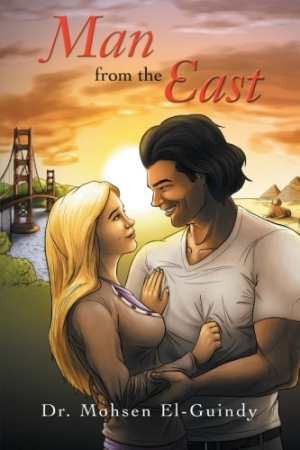
Man from the East
The wounds these lovers unwittingly self-inflict deepen this story of an interreligious relationship.
Mohsen El-Guindy’s compelling second novel, Man from the East, explores the differences between Western capitalism and Eastern Islamic economic theory against the backdrop of a romance between an Egyptian man and an American woman. As a prolific writer and scholar, the author aims to educate the world about what he views as the true nature of Islam, especially in the wake of negative opinions about his religion following the 9/11 terrorist attacks. The novel simultaneously educates and entertains by investing the audience in the story.
Ali Abdel Razek’s love affair with Diana Stevenson begins during their very first days at college in North Carolina. Diana’s father, a wealthy state senator, disapproves of their relationship because Ali’s theories of moneymaking do not jibe with American capitalism. Ali tells her, “Material welfare must be twinned with faith. Otherwise, it turns into a threat, the effects of which we see clearly in the developed world with the increase in immoral behavior. Material progress, without faith … is likely to make people miserable.”
The couple’s inability to express feelings after one is inadvertently hurt by the other, compounded by the machinations of Diana’s profit-driven, materialistic father, threatens the pair’s union. El-Guindy portrays Diana and Ali as kind and smart, making them easy to empathize with. The wounds the lovers unwittingly self-inflict deepen the story.
At one point, Ali becomes immobile after Diana rejects him: “his mind was not impaired, but it was mortally wounded, and had taken him back to his childhood, when he felt safe and happy.” While such a regression in the name of love is rare, passages such as this one prove that the author knows the strength of passion. While the author shows Ali’s personality through word and deed, he often summarizes Diana’s traits. Even the secondary characters, such as Diana’s dad and the hard-drinking, sleazy James, have scenes that show their personalities in action. When Diana’s summary paragraphs are compared with other characters acting out their strengths and flaws, the overall character development can seem slightly uneven, but El-Guindy makes up for it by developing all characters whether through summary or actions.
It is refreshing to see that Diana has more trouble with Ali’s economic philosophy than she does with the fact that he practices Islam. In a post-9/11 world that remains quick to condemn Muslim religious practices, El-Guindy’s romance happily shifts the main focus away from faith-based differences. In attempting to describe Islam, however, El-Guindy oversimplifies by portraying everything Islamic as good and everything capitalist as bad. For example, Islam forbids the use of alcohol. Once Diana indulges, she soon becomes an addict, becomes pregnant, and ends up birthing an unbelievably ugly stillborn. El-Guindy sometimes employs similar heavy-handedness when it comes to economics. Some sections of the novel feel like descriptive essays to convince readers of the worthiness of Islamic economics. These sections, with their overuse of economic jargon, interrupt plot flow.
While much of the dialogue that addresses economics would be more at home in a textbook than in a novel, the book shines in its declarations of love and emotional depths. Ali and Diana’s words of love, while formal and tending toward the dramatic, suggest vivid original feelings instead of trite sentiments. The heartfelt dialogue believably conveys the depth of their affection, although they never consummate their relationship. Ali declares love “the most precious thing man can offer.”
Readers intrigued by intercultural romance will love El-Guindy’s novel.
Reviewed by
Jill Allen
Disclosure: This article is not an endorsement, but a review. The publisher of this book provided free copies of the book and paid a small fee to have their book reviewed by a professional reviewer. Foreword Reviews and Clarion Reviews make no guarantee that the publisher will receive a positive review. Foreword Magazine, Inc. is disclosing this in accordance with the Federal Trade Commission’s 16 CFR, Part 255.
